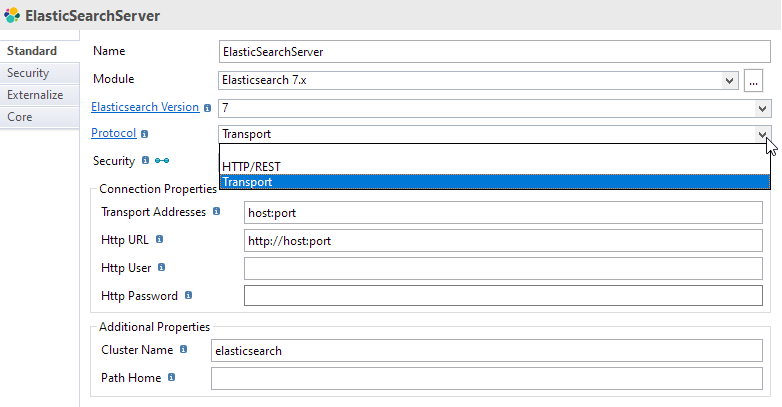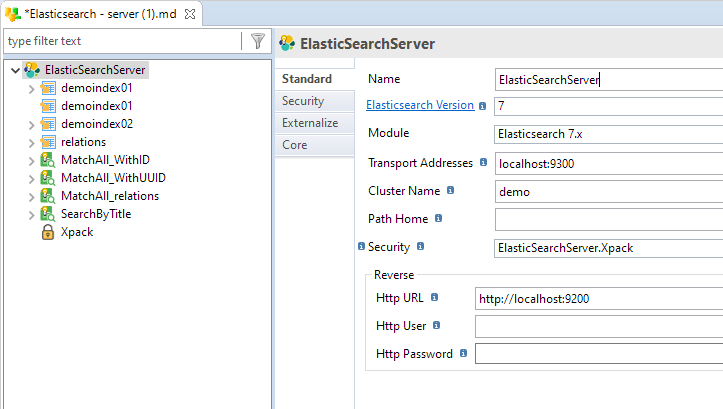This article describes the principal changes of Elasticsearch Component.
If you need further information, please consult the full changelog.
The download section can be found at this page.
Note:
Stambia DI is a flexible and agile solution. It can be quickly adapted to your needs.
If you have any question, any feature request or any issue, do not hesitate to contact us.
This article is dedicated to Stambia DI 2020 (S20) or higher.
If you are using Stambia DI S17, S18 and S19 please refer to this article for ElasticSearch Templates or to this article for ElasticSearch Connector.
Component.Elasticsearch.2.2.0
Bug fixes
This version fixes a list of issues which can be found on the full changelog.
Component.Elasticsearch.2.1.0
Support of EMF Compare
Several improvements have been made to support EMF Compare.
Component.Elasticsearch.2.0.5
Bug fixes
This version fixes a list of issues which can be found on the full changelog.
Component.Elasticsearch.2.0.4
Ability to choose communication protocol
Stambia Elasticsearch Component was using Elasticsearch's Transport protocol to communicate with and perform operations on Elasticsearch.
This protocol has been deprecated by Elasticsearch, which currently recommends using the HTTP/REST protocol.
This new Elasticsearch Component version supports using the HTTP/REST protocol for communicating with Elasticsearch.
A new attribute has been added to allow choosing which protocol to use.
Default selected protocol is "Transport" for backward compatibility.
Below is some information about the two protocols.
Transport protocol
Legacy Elasticsearch protocol which was the default protocol used by Stambia's Elasticsearch Component.
It is supported by Elasticsearch until Elasticsearch version 7.
It is currently deprecated by Elasticsearch, and later versions will not support it.
HTTP/REST protocol
HTTP/REST Elasticsearch protocol.
It is the currently recommended protocol client by Elasticsearch.
It is supported from Elasticsearch 5.6 and higher versions.
Choosing the protocol in Metadata
In Elasticsearch Metadata, you can select the new protocol on the main server node.
Default value is Transport for backward compatibility.

Note that "Transport addresses" fields attribute is displayed only when transport protocol is selected.
The HTTP Protocol cannot be used with Elasticsearch Version 2.
Elasticsearch 2.x legacy support
Elasticsearch 2.x support is now kept as legacy and compatibility purposes, as this version is not supported anymore by Elasticsearch.
Only maintenance and critical fixes will be performed on Elasticsearch 2.x.
Change Data Capture (CDC)
Multiple improvements have been performed to homogenize the usage of Change Data Capture (CDC) in the various Components.
Parameters have been homogenized, so that all Templates should now have the same CDC Parameters, with the same support of features.
Multiple fixes have also been performed to correct CDC issues. Refer to the changelog for the exact list of changes.
Component.Elasticsearch.2.0.3
Support Xpack Security
Xpack security is now supported by the Component.
You can define a new Xpack security node under your Elasticsearch Metadata.
Define the required properties on it, which may differ depending on your Xpack configuration.

And then use this Xpack node as security by selecting it on security attribute:

Ability to limit the number of hits returned when performing searches
A new parameter is available on Search Template to limit the number of hits to return.
It is named "ESearch Hit Limit" and defaults to "-1" to retrieve all hits.
Bug fixes
This version fixes a list of issues which can be found on the full changelog.
Most notably, it fixes issues with cluster name and Search Guard properties which were ignored.
Do not hesitate to take a look at it to have an idea of what have changed.
Component.Elasticsearch.2.0.2
Sample project
The component example project can now be imported directly in the "New" menu of the Project Explorer.
Component.Elasticsearch.2.0.1
XPath Functions
Addition of new XPath functions to access the various SSL and HTTP attributes values.
It can be used when needing to retrieve those information in various places, and will be used when necessary in Templates.


